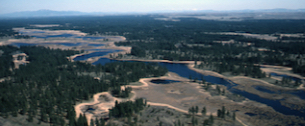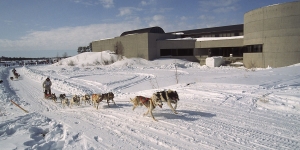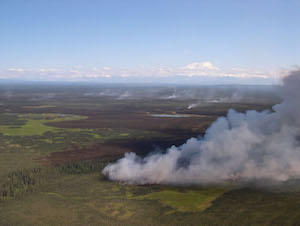Climate Change
ETS NAI 2-Day Course 2019

November 11-12, 2019
NAI National Conference, Denver, CO
This workshop is designed to help interpreters meet the challenges of connecting with visitors on climate change. It provides foundational climate science, engagement with scientists and peers, and exposure to new technologies.
We’ll include dedicated time for creating a plan to integrate the latest science, emerging technologies, and innovative communication techniques into interpretive efforts. We emphasize systems thinking for understanding and interpreting climate change. NASA visualizations and citizen science tools, and examples of climate interpretation are highlighted.
We will spend the second day at the National Center for Atmospheric Research (NCAR) Mesa Lab (transportation provided). There we will learn about and discuss local impacts of global change with researchers studying climate and global dynamics and engage with NCAR’s communication and education professionals. Together we will share and compare best practices and challenges in climate science communication and audience engagement.
Target Audience: Employees from the USFS, USFWS, and other Federal, State and Municipal agencies, as well as non‐profit and private organizations with science communicators, interpreters, environmental educators and education specialists. Participants are expected to have some experience with interpretation/science communication. Knowledge of climate science is not required.
ETS NAI 2-Day Course 2017

November 13-14, 2017
NAI National Conference, Spokane, WA
Interpreting climate change can be challenging! It’s complicated, and audiences may respond on a wide variety of emotional and intellectual levels. This two-day, highly interactive workshop joined interpreters and NASA science and education specialists to learn from each other about climate science and communication. We covered some basics of the science, and explored appropriate techniques for addressing this subject with a variety of audiences, including youth. Abundant interpretation, education and scientific resources were provided to support participants’ climate change interpretation efforts.
Target Audience: Employees from the USFS, USFWS, and other Federal, State and Municipal agencies, as well as non‐profit and private organizations with science communicators, interpreters, environmental educators and education specialists. Participants were expected to have some experience with interpretation/science communication. Knowledge of climate science is not required.
ETS Canada Course 2017

April 19-21, 2017
Yellowknife, Northwest Territories, Canada
Our first international course is focused on the connections between global climate and many of the regions across the Arctic which are already undergoing change. It will feature presenters from NASA’s ABoVE Research campaign, from several university across Canada, as well as scientists from the Government of the Northwest Territories (GNWT). This 3-day course will provide a collegial environment in which participants can develop climate communication products/programs/activities specific to their sites; it will encourage participants to collaborate with others who aren’t in attendance, extending the benefits and lessons learned to nearby communities; and it will help communicators develop key messages and products to help their Canadian audiences understand the many implications of changing climate in the North. The course is being held in Yellowknife and is planning to include a field trip to the Prince Of Wales Northern Heritage Center, which was designed to house and display objects that reflect the heritage of the Northwest Territories. Target audience for the course is experienced interpretive staff, education specialists, communication specialists, and other agency stakeholders, partners, and community organizations from across northern Canada.
ETS Mini-Course AK 2016

October 21st, 2016
Morris Thompson Cultural and Visitors Center, Fairbanks, AK
This mini-course will focus on the connections between global climate change and the regions across Alaska undergoing profound changes. We will feature scientists from the NASA ABoVE research campaign and other institutions, and climate communication tips and techniques from experienced interpreters and education specialists. Particiants will gain an introductory understanding of how the interconnections of local, regional and global systems help drive profound changes occurring in Alaska, and elsewhere across our planet. They will also learn about impacts of changes already occurring on public lands around Alaska, perhaps including examples of permafrost vulnerability/resilience; changes in fire regime; snow impacts; greening and browning of vegetation; controls on carbon biogeochemistry; and changes to fish and wildlife habitat. During this session, they will also explore new citizen science activities that can both engage visitors and support NASA and other science in Alaska and beyond.
Course Announcement: ETS-AK_2016_Minicourse-Announcement.pdf
ETS @ PW 2016

May 3-5, 2016
The General’s Residence, Fort Mason, Golden Gate National Recreation Area, San Francisco
This workshop-style course led by partners from NASA, National Park Service, and other Federal agencies and non-governmental organizations, will provide participants with a foundation in climate science, emphasizing the connection between global and local processes. Our focus is on climate impacts of direct relevance to western coastal states. Session topics will include Sea level rise; Climate change impacts to cultural resources, animal migrations, forest ecology and water resources; among others. A field strip to nearby Marin Headlands will include case studies of interpreting sea level rise, a citizen science phenology effort and a visit to the Marine Mammal Center. Course content will be posted on this website as soon as possible following the course.
ETS @ AK 2015
.JPG)
October 14-16, 2015
BLM Campbell Creek Science Center, Anchorage, AK
This course was focused on climate science and communication at a regional level. Science content included global perspectives applied to the Alaska region, specifics about how the changing climate is affecting Alaska, and how changes in Alaska are affecting global patterns. A field trip to Portage provided opportunity to experience first hand some of these changes, and served as a case study for communicating about climate with the public. The course emphasized experiential learning, beginning with a few distance-learning components accomplished by participants on their own prior to attending the three-day face-to-face session in Anchorage. Approximately four months after the sessions were completed in Anchorage, a one-hour class webinar will be held, during which participants will share progress and challenges and receive feedback/assistance in executing their action plans. The collegial atmosphere of this course provided participants with many opportunities to engage with scientists, other communication practitioners and colleagues in collaborative learning. Presentations and additional content are available on this website for free, to registered Earth to Sky members.
ETS VI (5-day course)
February 25 - March 1, 2013
USFWS National Conservation Training Center, Shepherdstown, WV
Participants in this course examined climate change, its effects on natural and cultural resources in parks and refuges; and effective techniques for communicating about climate change with the public. This course included an increased emphasis on the interpretive process. A panel discussion about each partner agency's role in climate change communication featured Julia Washburn, NPS Associate Director for Interpretation and Education; Gaby Chavarria, Counsel to USFWS Director; and Piers Sellers, Deputy Director of the Science and Exploration Directorate at NASA-Goddard Space Flight Center. An evening panel, Engaging Youth About Climate Change, was open to the public.
ETS V (5-day course)
September 26 – 30, 2011
USFWS National Conservation Training Center, Shepherdstown, WV
Participants in this course examined climate change, its effects on natural and cultural resources in parks and refuges; and effective techniques for communicating about climate change with the public. This course included an increased emphasis on social science. A panel discussion about each partner agency's role in climate change communication included Gary Machlis, Science Advisor to NPS Director; Gaby Chavarria, Counsel to USFWS Director; and Waleed Abdalati, NASA Chief Scientist.
ETS IV (5-day course)
February 1-5, 2010
NPS Mather Training Center Harpers Ferry, WV
Participants in this course examined global climate change, its effects on natural and cultural resources in parks and refuges; and effective techniques for communicating about climate change with the public. This course featured a presentation on interpreting controversial subjects by the late David Larsen; as well as a panel discussion featuring National Park Service Director, Jon Jarvis; National Conservation Training Center Director, Jay Slack; and Goddard Space Flight Center’s Director of Earth Science, Peter Hildebrand.
ETS III (5-day course)
January, 2009
NPS Mather Training Center, Harpers Ferry, WV
This course featured over 25 NASA scientists and education specialists, who presented information on their research and programs related to Climate Change. Participants included 30 rangers from all regions of the National Park Service (NPS), plus several attendees from U.S. Fish and Wildlife Service (USFWS), and other informal education groups. Each participant developed an action plan to use NASA science content in interpretation and/or educational efforts, and committed to also train other education professionals on what they learned. ETS III was the first ETS course devoted solely to the topic of climate change.
2-Day Mini Course (Nov. 2012)
November 12-13, 2012
National Association for Interpretation National Workshop
In this interactive mini-course, participants explored interpretation of climate change, and began outlining a plan for doing so at their own site. The course was structured around the familiar "Interpretive Equation"
2-Day Mini Course (Nov. 2010)
November 15-16, 2010
National Association for Interpretation National Workshop
Climate change is a challenging topic for interpreters. It involves complex science on a global scale (is even more complex at the local scale), is controversial, and carries abundant misconceptions. To help participants meet these challenges, this pre-workshop session at NAI provided a basic foundation for interpreting climate change. We drew upon NASA’s extensive climate research to help address common misconceptions.
Distance Learning Course: Communicating Climate Change 101 (Feb-Mar 2011)
This electronic workshop, consisting of five 90-minute web-based seminars was presented in March of 2011 as a starting point for exploring the critical issue of climate change. It includes introductory material on science and communicaiton techniques as well as example products developed by ETS alumni.
